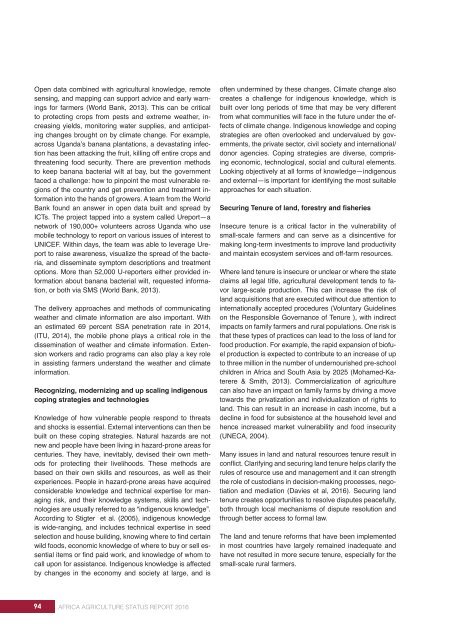AFRICA AGRICULTURE STATUS REPORT 2016
AASR-report_2016-1
AASR-report_2016-1
You also want an ePaper? Increase the reach of your titles
YUMPU automatically turns print PDFs into web optimized ePapers that Google loves.
Open data combined with agricultural knowledge, remote<br />
sensing, and mapping can support advice and early warnings<br />
for farmers (World Bank, 2013). This can be critical<br />
to protecting crops from pests and extreme weather, increasing<br />
yields, monitoring water supplies, and anticipating<br />
changes brought on by climate change. For example,<br />
across Uganda’s banana plantations, a devastating infection<br />
has been attacking the fruit, killing off entire crops and<br />
threatening food security. There are prevention methods<br />
to keep banana bacterial wilt at bay, but the government<br />
faced a challenge: how to pinpoint the most vulnerable regions<br />
of the country and get prevention and treatment information<br />
into the hands of growers. A team from the World<br />
Bank found an answer in open data built and spread by<br />
ICTs. The project tapped into a system called Ureport—a<br />
network of 190,000+ volunteers across Uganda who use<br />
mobile technology to report on various issues of interest to<br />
UNICEF. Within days, the team was able to leverage Ureport<br />
to raise awareness, visualize the spread of the bacteria,<br />
and disseminate symptom descriptions and treatment<br />
options. More than 52,000 U-reporters either provided information<br />
about banana bacterial wilt, requested information,<br />
or both via SMS (World Bank, 2013).<br />
The delivery approaches and methods of communicating<br />
weather and climate information are also important. With<br />
an estimated 69 percent SSA penetration rate in 2014,<br />
(ITU, 2014), the mobile phone plays a critical role in the<br />
dissemination of weather and climate information. Extension<br />
workers and radio programs can also play a key role<br />
in assisting farmers understand the weather and climate<br />
information.<br />
Recognizing, modernizing and up scaling indigenous<br />
coping strategies and technologies<br />
Knowledge of how vulnerable people respond to threats<br />
and shocks is essential. External interventions can then be<br />
built on these coping strategies. Natural hazards are not<br />
new and people have been living in hazard-prone areas for<br />
centuries. They have, inevitably, devised their own methods<br />
for protecting their livelihoods. These methods are<br />
based on their own skills and resources, as well as their<br />
experiences. People in hazard-prone areas have acquired<br />
considerable knowledge and technical expertise for managing<br />
risk, and their knowledge systems, skills and technologies<br />
are usually referred to as “indigenous knowledge”.<br />
According to Stigter et al. (2005), indigenous knowledge<br />
is wide-ranging, and includes technical expertise in seed<br />
selection and house building, knowing where to find certain<br />
wild foods, economic knowledge of where to buy or sell essential<br />
items or find paid work, and knowledge of whom to<br />
call upon for assistance. Indigenous knowledge is affected<br />
by changes in the economy and society at large, and is<br />
often undermined by these changes. Climate change also<br />
creates a challenge for indigenous knowledge, which is<br />
built over long periods of time that may be very different<br />
from what communities will face in the future under the effects<br />
of climate change. Indigenous knowledge and coping<br />
strategies are often overlooked and undervalued by governments,<br />
the private sector, civil society and international/<br />
donor agencies. Coping strategies are diverse, comprising<br />
economic, technological, social and cultural elements.<br />
Looking objectively at all forms of knowledge—indigenous<br />
and external—is important for identifying the most suitable<br />
approaches for each situation.<br />
Securing Tenure of land, forestry and fisheries<br />
Insecure tenure is a critical factor in the vulnerability of<br />
small-scale farmers and can serve as a disincentive for<br />
making long-term investments to improve land productivity<br />
and maintain ecosystem services and off-farm resources.<br />
Where land tenure is insecure or unclear or where the state<br />
claims all legal title, agricultural development tends to favor<br />
large-scale production. This can increase the risk of<br />
land acquisitions that are executed without due attention to<br />
internationally accepted procedures (Voluntary Guidelines<br />
on the Responsible Governance of Tenure ), with indirect<br />
impacts on family farmers and rural populations. One risk is<br />
that these types of practices can lead to the loss of land for<br />
food production. For example, the rapid expansion of biofuel<br />
production is expected to contribute to an increase of up<br />
to three million in the number of undernourished pre-school<br />
children in Africa and South Asia by 2025 (Mohamed-Katerere<br />
& Smith, 2013). Commercialization of agriculture<br />
can also have an impact on family farms by driving a move<br />
towards the privatization and individualization of rights to<br />
land. This can result in an increase in cash income, but a<br />
decline in food for subsistence at the household level and<br />
hence increased market vulnerability and food insecurity<br />
(UNECA, 2004).<br />
Many issues in land and natural resources tenure result in<br />
conflict. Clarifying and securing land tenure helps clarify the<br />
rules of resource use and management and it can strength<br />
the role of custodians in decision-making processes, negotiation<br />
and mediation (Davies et al, <strong>2016</strong>). Securing land<br />
tenure creates opportunities to resolve disputes peacefully,<br />
both through local mechanisms of dispute resolution and<br />
through better access to formal law.<br />
The land and tenure reforms that have been implemented<br />
in most countries have largely remained inadequate and<br />
have not resulted in more secure tenure, especially for the<br />
small-scale rural farmers.<br />
94 <strong>AFRICA</strong> <strong>AGRICULTURE</strong> <strong>STATUS</strong> <strong>REPORT</strong> <strong>2016</strong>


